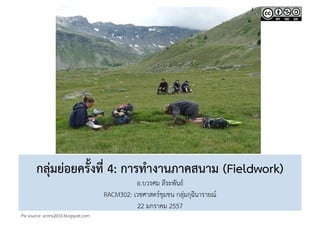
Fieldwork 2014.1.22
- 1. กลุ่มย่อยครั้งที่ 4: การทำงานภาคสนาม (Fieldwork) อ.บวรศม ลีระพันธ์ RACM302: เวชศาสตร์ชุมชน กลุ่มกุฉินารายณ์ 22 มกราคม 2557 Pix source: ecrins2010.blogspot.com
- 2. Outline • วัตถุประสงค์ของการเรียน/ทำงานภาคสนาม (purposes) • บุคคลที่เกี่ยวข้องกับการเรียน/ทำงานภาคสนาม (participants) • หลักการเรียนรู้จากการทำงานภาคสนาม (principles) • การวางแผนการทำงาน (practices) Pix source: online.wsj.com
- 3. Chaos vs. Order Ø 4Ps: “Chaordic Design Process” – Purpose – Principle – Participant – Practice Source: chaordic.org
- 4. Purpose • Why we have to do a fieldwork? • Is studying in a classroom not enough? – If so, why not?
- 5. Purpose: Brainstorming • Fieldwork is an irreplaceable learning experience: – To see the linkage between the “abstract” and the “concrete”. – To learn not only “cognitive knowledge”, but also “attitude/Inspiration” and “skills” (HEAD, HEART, HANDS). – To understand “community” and learn a “context-specific” knowledge. – To understand a “big picture” from seeing a small portion of Thailand’s health system and health services system. – To use both “deductive” vs. “inductive” learning skills. – To see the “gap” of what/how people think/believe/feel vs. how health professionals operate. – To learn “holistic” medicine from people living in family/community
- 6. What Level of Our Learning? Wisdom • Why Knowledge • How Informa8on • What, Who, When, Where Data • Number, Text, Picture, Sound, etc.
- 7. Principle Ø “Up and down the ladder of abstraction” นามธรรม: • • • • แนวคิด (concepts) ทฤษฎี (theories) หลักการ (principles) กลยุทธ์ (strategies) รูปธรรม: Source :influxentrepreneur.com/wendyelwell/ • • • • การเก็บข้อมูลและวิเคราะห์ข้อมูล (data) กรณีศึกษา (case studies) การทำงานภาคสนาม (fieldwork) การนำเสนองาน (presentations)
- 8. Principle Ø “Experience, not explanation.” EXPERIENCE Picture source: commonsenseatheism.com; variety.thaiza.com
- 9. Principle 1. 2. 3. 4. 5. Climbing “the ladder of abstraction” Learning by doing (“experience, not explanation.”) Trying to learn as a “team” (not a group or individuals) Creating “your own knowledge” (not just collecting “data or information” & not just “adopting” others’ knowledge.) Trying to learn from emerging opportunities in the field (not just to fulfill the homework/assignment only
- 10. Participant • In fieldwork, we can learn from: – Patients, People (ชาวบ้าน), Faculty (อาจารย์), Hospital staffs, Resource persons (วิทยากร)—via lecture, Q&A, group discussion, etc. – Friends/colleagues—via working with each others, listening to your friend’s different exposures AND your friend’s different thoughts/ interpretations of the same exposures. – Yourself—via observing how each of you respond to experiences and situations in the fieldwork, how your thoughts/beliefs have changed, how you adapt, AND how you “grow”.
- 11. Practice • Health determinants: “Web of Causations” Figure source: รายงานสรุปการศึกษาภาคสนาม โดยนักศึกษาแพทย์ คณะแพทยศาสตร์รพ.รามาธิบดี ชั้นปีที่ 3 กลุ่มกุฉินารายณ์ ปีการศึกษา 2555
- 12. Study Approaches Positivism Study tools Critical Realism Relativism/Interpretivism/ Social Constructionism • Measurements through survey, use of archival and other data records • Statistical analysis • Qualitative data analysis (through semi-structured interview and rigid interviewing procedures) • Multiple data (review of documents, range of interviewing methods, observation) • Qualitative data analysis (through in-depth interviewing, focus-group interviewing, documentary review, participant observation, life histories)
- 13. Theory U X Senge, P., Scharmer, C.O., Jaworski, J. & Flowers, B.S. (2004). Presence- Exploring Profound Change in People, Organizations and Society.
- 14. Going Deeper • Multiple levels of how we can learn from the fieldwork: – Downloading: To test our knowledge e.g. test hypotheses – Observing (using “open mind”): To understand new knowledge e.g. why and how do people think or behave in a certain way? – Sensing (using “open heart”): To empathize people we met and create our own insight/knowledge – Presencing (using “open will”)
- 15. Going Deeper 1. Know “what to ask & how to ask” 2. Need skills to identify “emerging opportunities to learn” and “emerging themes”
- 16. Practice • Be prepared, be prepared, be prepared. • Even well prepared, practices in the field can always be changed if necessary. • However, any changes will be done according to our agreed “proposes”, “participants”, and “principles”.
